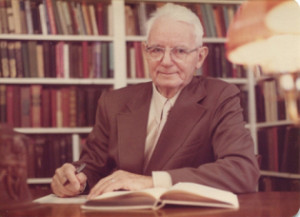 In response to A.E Taylor’s ‘Does God exist?’ Van Til writes:
In response to A.E Taylor’s ‘Does God exist?’ Van Til writes:
“Taylor simply assumes that every human mind, that of an apostle no less than that of any other man, contributes in an original sense to what it receives. The result is that even if he could believe in a self-contained God – which on his premises he cannot – Taylor cannot believe that any man could receive any revelation from such a God without to some extent, in the very act of reception, confusing it with his own experiences that operate independently of this God.
The whole attitude of the modern man with respect to this idea of authoritative revelation such as is given in Scripture may therefore be summed up in the following points.
Such a God as scripture speaks of simply does not exist. This idea of the non-existence of God is involved, as has been noted, in the assumption of brute factuality. In the second place, if such a God did exist, he could not manifest himself in the world that we know. For that world is known to be something other than the revelation of God; it is known to be a combination of brute factuality and the rationalizing activity of autonomous man with respect to them. In the third place, even if such a God did reveal himself in such a world as is known to be something other than a manifestation of him, no man could receive such a revelation without falsifying it. In the fourth place, if in spite of these three points a revelation has been received in the past, it could not be transmitted to men of the present time without again falsifying it. In the fifth place, if in spite of everything such a revelation of such a God as the Bible speaks of came to man today, he in turn could not receive it without falsifying it.”
Cornelius Van Til – Christian apologetics second edition – P187-188
Leave a Reply